|
|
|
Sort Order |
|
|
|
Items / Page
|
|
|
|
|
|
|
| Srl | Item |
| 1 |
ID:
082465
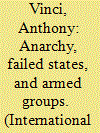

|
|
|
|
|
| Publication |
2008.
|
| Summary/Abstract |
Systemic theories of international politics divide the world into anarchic and hierarchic systems. Conventionally, the boundary of each system is based on juridically defined territorial borders. This article argues that within collapsed and "fragmented" states there exist autonomous armed groups, which make these states by definition anarchic systems. Unlike earlier accounts of such "domestic anarchy," this article argues that the domestic anarchy is "open" or connected to the international anarchic system. By taking this approach, it is possible to integrate the theoretical understanding of the relations between armed groups and (external) states. Specifically, the article illustrates how there can be "mixed security dilemmas" between states and armed groups, and that other theoretical concepts usually reserved for describing interstate relations can potentially be used to describe state-armed group relations
|
|
|
|
|
|
|
|
|
|
|
|
|
|
|
|
| 2 |
ID:
082467
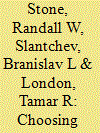

|
|
|
|
|
| Publication |
2008.
|
| Summary/Abstract |
International relations theory has borrowed important intuitions from Olson's static public-goods model (hegemonic stability) and the repeated prisoners' dilemma (theories of international cooperation), and arguments often combine implications from both models. We develop a general, repeated public-goods model. We then allow the qualitative dimensions of cooperation to emerge endogenously: agreements can have broad or narrow membership and entail deep or shallow commitments; they can be multilateral or discriminatory; they can be ad hoc or institutionalized. We find that the relationship between the distribution of power and international cooperation is complex: a large leading state forms a narrow coalition of intensive contributors, and builds institutions, while a smaller leading state forms a broader coalition that makes shallow contributions, and is more inclined to multilateralism
|
|
|
|
|
|
|
|
|
|
|
|
|
|
|
|
| 3 |
ID:
082462
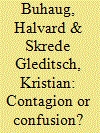

|
|
|
|
|
| Publication |
2008.
|
| Summary/Abstract |
Civil wars cluster in space as well as time. In this study, we develop and evaluate empirically alternative explanations for this observed clustering. We consider whether the spatial pattern of intrastate conflict simply stems from a similar distribution of relevant country attributes or whether conflicts indeed constitute a threat to other proximate states. Our results strongly suggest that there is a genuine neighborhood effect of armed conflict, over and beyond what individual country characteristics can account for. We then examine whether the risk of contagion depends on the degree of exposure to proximate conflicts. Contrary to common expectations, this appears not to be the case. Rather, we find that conflict is more likely when there are ethnic ties to groups in a neighboring conflict and that contagion is primarily a feature of separatist conflicts. This suggests that transnational ethnic linkages constitute a central mechanism of conflict contagion
|
|
|
|
|
|
|
|
|
|
|
|
|
|
|
|
| 4 |
ID:
082468
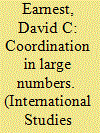

|
|
|
|
|
| Publication |
2008.
|
| Summary/Abstract |
How do states solve n-choice cooperation problems? Although classical game theory offers useful insights into how states achieve cooperation, its focus on equilibria means that it is largely silent on the processes of negotiation, particularly when multiple solutions to a cooperation problem exist. To explore the path histories of international cooperation, this article uses an agent-based model to explore how states solve a coordination game with three equilibria. To further enrich the analysis, the model explores how domestic constraints may affect coordination games. Such state-level constraints may present negotiators with considerable informational costs and high barriers to understanding each other's preferences. The model finds that the process of communicating preferences can greatly affect the prospects for cooperation, independent of distributional consequences and concerns about cheating. It also finds that, contrary to collective goods theory, a large number of states coordinate a solution to the problem easier than small groups. This is because larger groups create denser networks that communicate preferences more efficiently. The agent-based model thus illustrates how simulation as a method can challenge our extant thinking about cooperation among nation-states. These findings have implications for research on interstate coordination, since it suggests transnational linkages may help states overcome information barriers that frustrate agreements
|
|
|
|
|
|
|
|
|
|
|
|
|
|
|
|
| 5 |
ID:
082466
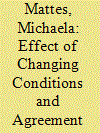

|
|
|
|
|
| Publication |
2008.
|
| Summary/Abstract |
Can agreements that states sign in order to manage competing claims help ensure a durable peace? This article examines the effect of "conciliatory agreements" that include attempts to address differences after significant conflict has occurred, such as peace agreements, as well as agreements designed to manage competing claims before they reach the level of violence. I argue that provisions specified in conciliatory agreements make the existing peaceful equilibrium more robust against the potentially disruptive effect of shocks, such as changes in relative capabilities or regime type. Conciliatory agreements not only increase the likelihood that peace is maintained but also impact the kind of peace maintained. Specifically, competing states may remain at peace either because they retain the status quo or because they peacefully renegotiate. Varying agreement provisions can account for why some states resort to force, while others peacefully renegotiate. I test the propositions concerning the effect of shocks and agreement provisions on the durability of peace and the likelihood of renegotiation using cases of territorial claims
|
|
|
|
|
|
|
|
|
|
|
|
|
|
|
|
| 6 |
ID:
082464
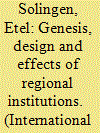

|
|
|
|
|
| Publication |
2008.
|
| Summary/Abstract |
Why do regional institutions emerge, what accounts for their variation in design, and what are their effects? Several conceptual and epistemological perspectives-neorealism, neoliberal-institutionalism, constructivism, and domestic politics-provide competing and complementary answers to these questions. I focus on regional organizations as productive arenas for developing contingent propositions on institutions more generally. The purpose is to advance cross-paradigmatic dialogue in two ways: through sensitivity to scope conditions and to institutional genesis, forms, and effects, in an effort to transcend axiomatic debates that often conflate different dependent variables. The empirical analysis includes the Association of Southeast Asian Nations (ASEAN), Asia-Pacific Economic Cooperation (APEC), ASEAN Regional Forum (ARF) and the Arab League. The main findings from these cases suggest that understanding the nature of dominant domestic coalitions is often crucial for explaining incentives to create, design, and fine-tune the effects of institutions. However, this is mainly the case when the consequences of creating or designing institutions for power distribution, transaction costs, and norms are negligible or hard to estimate. In many cases these consequences are sizeable, reducing the explanatory influence of domestic coalitions. The latter often provide no more than permissive conditions for the emergence, design, and effect of institutions. Their influence is most decisive in explaining institutional genesis but is often underdetermining in explaining their design
|
|
|
|
|
|
|
|
|
|
|
|
|
|
|
|
| 7 |
ID:
082463


|
|
|
|
|
| Publication |
2008.
|
| Summary/Abstract |
Does government involvement in the economy promote ethnic peace, or does it contribute to ethnic violence? Two theories, grievances and opportunity, suggest that government involvement in the economy reduces ethnic violence. We present an alternative security-based logic that focuses on the role of economic rents in political competition. Our theory of insecurity predicts that free market economies reduce violent ethnic conflict by reducing fear and insecurity. We present statistical analyses, using data from the Minorities at Risk project and the Index of Economic Freedom, showing that government involvement in the economy increases ethnic rebellion. Our results suggest that the overall size of the public sector is less important than government interference with the market allocation mechanism. We conclude by discussing the policy implications of our findings
|
|
|
|
|
|
|
|
|
|
|
|
|
|
|
|
| 8 |
ID:
082469
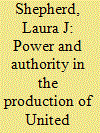

|
|
|
|
|
| Publication |
2008.
|
| Summary/Abstract |
United Nations Security Council Resolution (UNSCR) 1325 was adopted in 2000 with the aim of ensuring all efforts toward peacebuilding and post-conflict reconstruction, as well as the conduct of armed conflict itself, would entail sensitivity toward gendered violence and gendered inequalities. In this article, I contrast two accounts of the writing of UNSCR 1325 that issue from the two institutions that claim authority over the document: the United Nations Security Council and the NGO Working Group on Women, Peace and Security. I make a broader theoretical argument about the importance of paying analytical attention to the discursive terrain of international institutions when analyzing the formulation and implementation of security policy, concluding that contemporary theorizing of international institutions is product/productive of a particular configuration of political authority and legitimacy that can, and should, be challenged
|
|
|
|
|
|
|
|
|
|
|
|
|
|
|
|
| 9 |
ID:
082470


|
|
|
|
|
| Publication |
2008.
|
| Summary/Abstract |
Are equity markets just another facet of global finance, or are they unique in their responses to-and influences on-government policies and institutions? Recent work has explored the impact of political factors on bond market behavior and foreign direct investment, but little attention has been paid to stock markets. On the basis of the particular concerns of equity investors, we hypothesize a positive association between stock-market valuations and levels of democracy, shareholder rights, legal traditions, and capital-account liberalization, a negative association with real interest rates, and no association with fiscal deficits or surpluses. We assess our expectations by analyzing the political and institutional determinants of aggregate price-to-earnings ratios for a sample of up to 37 countries from 1985 to 2004, using both cross-sectional and time-series cross-sectional analyses. We find support for most, but not all, of our hypotheses. Our findings suggest that we must disaggregate the effects of different asset markets to understand the impact of economic globalization on government policies
|
|
|
|
|
|
|
|
|
|
|
|
|
|
|
|
| 10 |
ID:
082471


|
|
|
|
|
| Publication |
2008.
|
| Summary/Abstract |
During the twentieth century, the United States shifted from embracing protectionism to being an advocate for global free trade. Scholarly debate has focused on whether this shift was solely because of changes in preferences or if changes to institutions also played a role. Relying upon access point theory, this article argues that an institutional change, delegation to the President, led to endogenous changes in preferences. Delegation makes it harder for interest groups to gain access to policy makers, which should raise the costs of all lobbying. As protectionists dominate lobbying due to their collective action advantage, they will be disproportionately hurt. Thus, delegation should lead to less lobbying and lower tariff rates. These arguments are tested on time series data of tariff rates using an Error Correction Mechanism model and on data on interest group testimony before Congressional committee
|
|
|
|
|
|
|
|
|
|
|
|
|
|
|
|
|
|
|
|
|